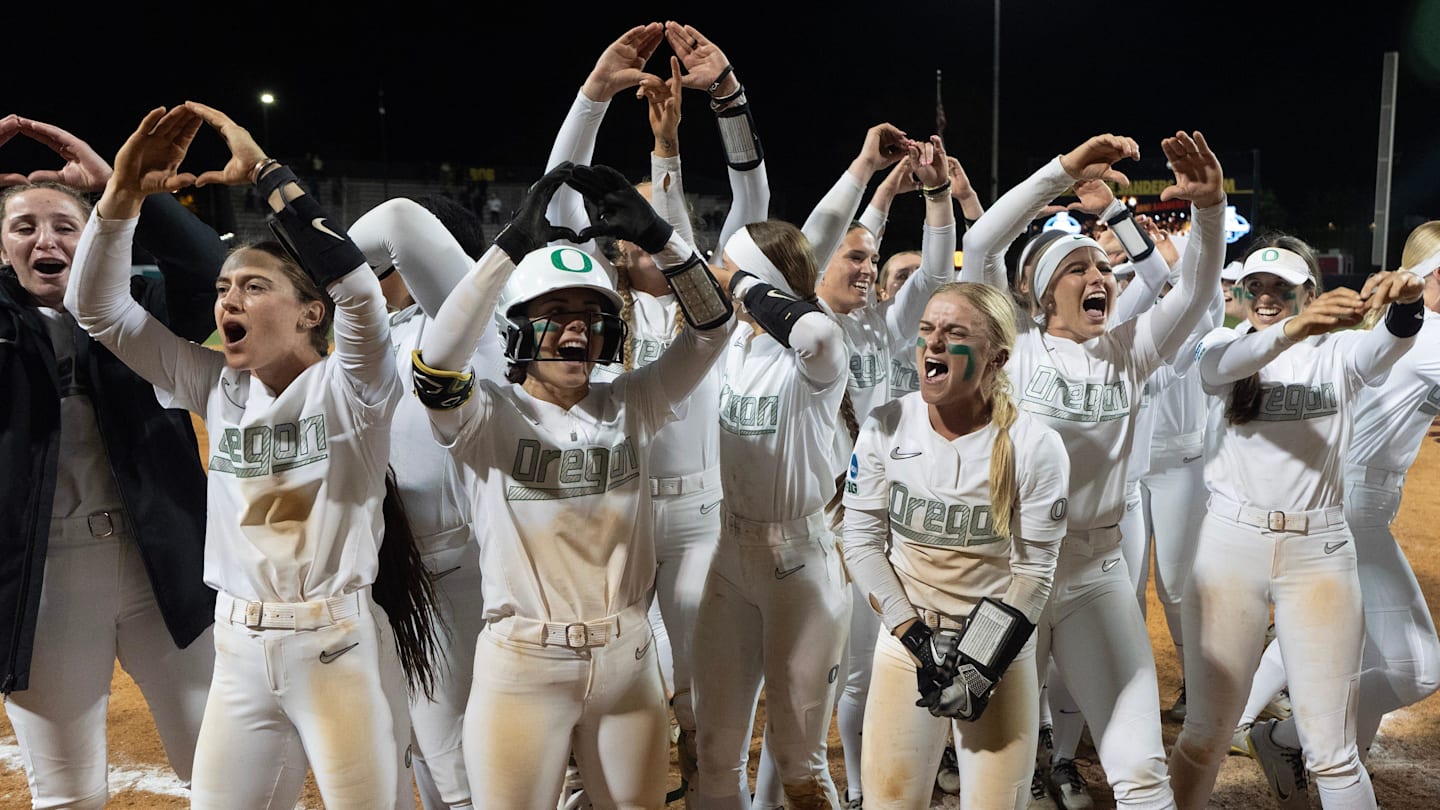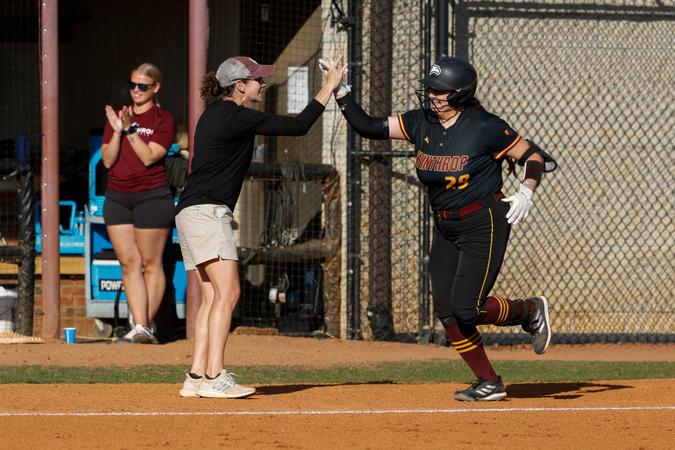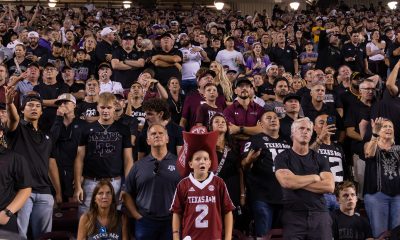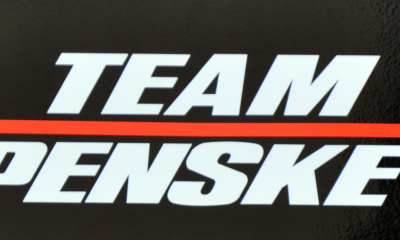NIL
Oregon softball signs Addison Amaral, 2-time All-ACC shortstop from Notre Dame
On Friday Oregon softball coach Melyssa Lombardi signed Addison Amaral, a shortstop from Salinas, California who played her first two seasons at Notre Dame University . Amaral led the Irish in nearly every offensive category in 2025, tops on the team in “batting average, runs, hits, doubles, home runs, RBI, total bases, slugging percentage, walks, […]

On Friday Oregon softball coach Melyssa Lombardi signed Addison Amaral, a shortstop from Salinas, California who played her first two seasons at Notre Dame University .
Amaral led the Irish in nearly every offensive category in 2025, tops on the team in “batting average, runs, hits, doubles, home runs, RBI, total bases, slugging percentage, walks, on-base percentage, and sacrifice flies,” according to Softball America.
She hit .365 as a sophomore with nine home runs and 43 RBI. Amaral fills a critcal need for Lombardi and the team, replacing Gold Glove shortstop Paige Sinicki, a senior who just signed an AUSA pro contract.
Amaral had 31 offers in the portal since entering on May 21.
Notre Dame SS Addison Amaral has entered the transfer portal.
A two-time all-ACC selection, Amaral owns a career .352 batting average with 19 home runs, 26 doubles, 96 RBIs, and 60 runs scored. pic.twitter.com/XlMQavu0Fq
— Justin McLeod (@justfactsmaam) May 22, 2025
She comes by her athletic talent naturally but the hard work is all hers. Her father Chad played football at Santa Clara. At Notre Dame High School in Salinas she earned all-state honors as a senior with 99 hits and 23 career home runs.
“Addison Amaral does it again!”
2nd 2-run homer of the day for Addi
ACCNX | @AddisonAmaral pic.twitter.com/g5x9XGMFfG
— Notre Dame Softball (@NDsoftball) April 19, 2025
She’s the second Northern California addition for the Ducks this June, joining versatile power-hitting utility player Elon Butler from San Jose and the Cal Bears, who signed with the team on Wednesday.
For Duck fans, it’s great to see that the House Settlement and impending revenue shakeup hasn’t slowed momentum in the program. Coach Lombardi talks about Version 8, her vision for the 2026, building on the success of this year’s 54-10 squad that won the Big Ten Championship, came back to beat Stanford in the Eugene Regional and Liberty in the Super Regional.
The Ducks will have pitchers Lyndsey Grein and Elise Sokolsky back, plus these two big bats from the portal. The fabulous freshmen who played so well this season return, first baseman Rylee McCoy, designated player Stefini Ma’ake, catcher Emma Cox, second baseman Kaylynn Jones, all full-time starters.
Slap-hitting specialist Jones hit .345 batting out of the eighth spot for the Ducks, with 23 walks and 16 stolen bases. She’s a great candidate to lead off next year with Kai Luschar graduated. McCoy and Ma’ake combined to blast 33 home runs (19 and 14 respectively) with 113 RBI (59, 54.)
Cox was a rock behind the plate for the Ducks, chipping in eight home runs and 34 RBI. Slick-fielding third basemen Katie Flannery, a junior-to-be from Birmingham, Alabama returns also, 97 assists and eight double plays in 2025.
Read More:
NIL
Paul Finebaum tells Deion Sanders to ‘stick to coaching’ after calling for college football salary cap
The House settlement hasn’t yet been in place for a full college season. Already, however, coaches around the country are looking for a solution to fix issues they see with revenue sharing. That now includes Colorado Buffaloes head coach Deion Sanders. At Big 12 media days, Sanders suggested putting a cap on rev-share, raising some […]

The House settlement hasn’t yet been in place for a full college season. Already, however, coaches around the country are looking for a solution to fix issues they see with revenue sharing. That now includes Colorado Buffaloes head coach Deion Sanders.
At Big 12 media days, Sanders suggested putting a cap on rev-share, raising some eyebrows in the process. In the wake of those comments, Paul Finebaum and Greg McElroy appeared on Get Up. There, Finebaum boldly told Sanders to stick to coaching.
“Right now, there’s so many issues in college football that getting to a cap,” Finebaum said. “It may happen one day, but I think they need to solve some more basic problems first.”
Finebaum notably thinks that Sanders’ argument would be different if he still had some of last season’s stars on his team. So, the messaging is likely based on what would be best for Colorado right now.
“I just love Deion for a lot of reasons,” Finebaum said. “But especially how he just changes the narrative depending on who is on his team. I mean, those two guys that he had last year, Shedeur [Sanders] and Travis [Hunter], could have left and broken everybody’s bank, and would have had he not had that hold over them. So I just think Deion needs to stick to coaching football. Let the college football leaders screw up the game the way they have already.”
The House settlement allows for revenue sharing of up to $20.5 million with athletes at a given school. How that money is divided and if the school spends the entire amount is up to the school. However, in most cases, football will receive the majority of the funding.
On top of that, House also looks to set a fair market on NIL spending. NIL deals above $600 will need third-party approval and will be sent to a new clearinghouse called NIL Go. There is also a new enforcement agency in place called the College Sports Commission.
“It’s just unrealistic at this point. I do think at some point there’ll be donor fatigue. I do think at some point, there will be more parameters in place,” Greg McElroy said. “And I’m cautiously optimistic that there will be competitive balance across the college football landscape. But the reality is, college football has never been fair. It’s like Major League Baseball. That’s what it is. I mean, we don’t live in the salary cap world in college football. Those with resources that can spend, win.”
McElroy looked to emphasize his comparison by explaining that the deepest pockets don’t always win. Upsets do happen. So, even if Sanders and Colorado aren’t the richest program, there are still opportunities on the field.
“The good news is, just like in baseball, the Yankees don’t win the World Series every year. The Tampa Bay Rays, who have one of the smallest payrolls, compete in the playoffs regularly,” McElroy said. “And are, at times, much better than those of their big-spending counterparts in the Red Sox and the Yankees. So I think college football, yes, it’s nice to have resources, but it can also work against you. Texas has just one national championship since 1970 and they have the deepest pockets in the land. So I think that, yes, it’s nice to have money, but at the end of the day, it doesn’t necessarily always equate to success on the field.”
Deion Sanders explained why he wanted to see a rev-share cap by pointing to last season’s national champions, the Ohio State Buckeyes. In particular, he looked at headlines that their roster was worth upwards of $20 million.
“I wish there was a cap. Like, the top-of-the-line player makes this and if you’re not that type of guy, you know you’re not going to make that. That’s what the NFL does. The problem is, you’ve got a guy that’s not that darn good, but he could go to another school and they give him another half a million dollars. You can’t compete with that. It don’t make sense,” Sanders said.
“You talk about equality … all you have to do is look at the playoffs and see what those teams spent, and you understand darn near why they’re in the playoffs. It’s kind of hard to compete with somebody who’s giving $25, $30 million to a darn freshman class. It’s crazy.”
NIL
Calipari speaks on never ending changes in college basketball
FAYETTEVILLE, Ark. — Arkansas recently hired general manager Remy Cofield to oversee all 19 sports, including basketball. That’s where Cofield’s experience is, he spent 12 seasons with the Boston Celtics, including nearly 5 years as the director of scouting. In the university’s press release, Cofield’s role was described as follows: “Oversee the strategic allocation of […]

FAYETTEVILLE, Ark. — Arkansas recently hired general manager Remy Cofield to oversee all 19 sports, including basketball. That’s where Cofield’s experience is, he spent 12 seasons with the Boston Celtics, including nearly 5 years as the director of scouting.
In the university’s press release, Cofield’s role was described as follows:
“Oversee the strategic allocation of department and affiliate resources to support Razorback head coaches in the acquisition and retention of championship-caliber athletic talent,” the university said in a statement. “He will lead player contract negotiations and collaborate with head coaches, recruiting coordinators and administrative staff in implementing each program’s strategic vision.”
Calipari struck a different tune when talking to media for the first time Wednesday. He seemed to be ushering Cofield towards the other 18 sports on campus and away from the one in which he has the most experience.
“I know all these agents,” Calipari said. “I was in the NBA for a while. I know them, my staff knows them. Who’s going to evaluate the player? Me. So now I’m like, yes, can you get us deals, can you get NIL deals, can you turn us on to that kind of stuff. Absolutely I want him involved in those things. But to evaluate players, what’s a kid’s value to his team? I got to do that.”
It’s been 25 years since Calipari held a position in the NBA. He was the assistant coach for the Philadelphia 76ers in from 1999-2000 before returning to college ever since with Memphis.
“’It’s more so just trying to get some time when he has time [so] that we can sit down over the summertime.” Cofield said on June 25. “He’s been busy the entire last nine months, so everybody’s trying to get away from it all. His coaching staff has been really open to me in a lot of different ways to have very open and honest conversations.”
Calipari also asked for sweeping changes with the way the transfer portal and the landscape of college sports. For one, the uncertainty still looms large over the sport.
“For anybody to know where this is going – they’re lying,” Calipari said. “For anybody to tell a family ‘we’re going to do this and we’re going to do this too, and this,’ they’re lying. Cause none of us know.”
The rule governing the transfer portal right now is in that there are no rules. Players are able to transfer as many times as they wish without penalty, something that Calipari believes not only creates chaos when building a roster, but is detrimental to most kids long-term futures, especially for kids who end up going to a new school each year.
“No college education [because of the transferring],” Calipari said. “They go for a job, they’re offered 55 thousand to start, and what do they say? ‘What? I was making 250. Do I have to go to work? Do you get me a car? Can I have an apartment?’ Okay, all I know is when you go from poor to having some money back to poor, now we’re talking mental health issues.”
Less than 24 hours after Calipari spoke, there’s been action in the Congress with the best chance at sweeping NIL and transfer portal legislation. The SCORE ACT, officially introduced Thursday, has both Republican and Democrat sponsorship.
According to a press release, the bill “establishes a uniform NIL standard for institutions and governing bodies and clarifies rulemaking authorities regarding eligibility, transfer timelines and compensation caps.”
The changes will keep coming, but for now, Calipari will take his team of six returners, seven first-year players and two transfers into his second year as Arkansas coach.
NIL
Joe Castiglione reveals how much his job changed with transfer portal, NIL
When Joe Castiglione was hired at Oklahoma at athletic director in 1998, there was no way for him to predict how much the NCAA landscape would change during what will end up being a three-decade tenure in Norman. Particularly, in the last decade of his tenure with the implementation of NIL and the NCAA transfer […]

When Joe Castiglione was hired at Oklahoma at athletic director in 1998, there was no way for him to predict how much the NCAA landscape would change during what will end up being a three-decade tenure in Norman. Particularly, in the last decade of his tenure with the implementation of NIL and the NCAA transfer portal.
Castiglione has overseen 26 of Oklahoma’s 45 total national championships, and is OU’s longest-serving AD. He positioned the Sooners for long-term success since the beginning his tenure, and it’s followed into the new era of college athletics. Under his guidance, Oklahoma seen at least one team compete for a national championship in each of the last 12 years.
“One of the most challenging parts of the period that we’re in is, there’s never been a moment like it. Not only in college athletics, I think you could look across various industries, they all go through some moment of disruption and change,” Catsiglione said. “And the ones that see the future, that adapt, pivot, be flexible, those are the ones that navigated, not only survived, but become stronger when they get on the other side.”
The Sooners have done just that, positioning themselves to be at the forefront of college athletics for years to come after aligning with the Southeastern Conference alongside Texas ahead of the 2024-25 academic calendar year. The move came just weeks after it was ruled that athletes could begin compensating from their name, image and likeness.
“We have to be uncomfortable with the uncomfortable period that we’re in, and that’s where we are,” he continued. “So if you’re not willing to lean into it, get scarred up, nicked up and try to find the solutions that are necessary in this moment in time where we’re still not structured the way we should be, … realize sometimes that you don’t have full control of everything, but you better exert as much as you can. Lean into the future and don’t be afraid to be a change agent.”
Those at the forefront of college athletics are the ones who are able to adapt to the current state of college athletics. With just under three years to find Castiglione’s successor, adaptability is likely a quality the Sooners will be looking for in their next athletic director.
“However you want to define the the skills of the next AD, you better be a leader that can lean in, accept and effectuate change of the future,” Castiglione said. “Because if the people in the business don’t do the leading, then who is?”
NIL
Powell Cracks Mid-Major Top 100 Player Rankings
Story Links Rock Hill, S.C. – D1 Softball announced its 2025 Mid-Major D100 Player Rankings and Winthrop standout Megan Powell was ranked 97th. Powell adds more recognition to a season that saw her voted as the 2025 Big South Conference Player of the Year. Powell was also an All-Big […]

Rock Hill, S.C. – D1 Softball announced its 2025 Mid-Major D100 Player Rankings and Winthrop standout Megan Powell was ranked 97th.
Powell adds more recognition to a season that saw her voted as the 2025 Big South Conference Player of the Year. Powell was also an All-Big South First Team selection, NFCA All-Region Selection and was named to the Big South All-Tournament Team. She also earned academic recognition as she was named to the College Sports Communicators Academic All-District Team.
This year she led the team with a .333 average to go along with 27 runs, seven doubles, 10 home runs, 35 RBI, 22 walks and an on-base percentage of .425. In the circle she was 16-12 with a 2.15 ERA, 16 complete games, five shutouts and 122 strikeouts in 163 innings. She also held an opposing batting average of .206.
Powell was 1-of-2 Big South Conference players recognized, joining Radford’s Dakota Redmon on the list.
The Top 100 rankings list can be found here.
STAY SOCIAL WITH THE EAGLES
For everything Winthrop softball visit www.winthropeagles.com or follow us on social media @Winthropsoftbal, winthropsoftball (Instagram) or www.facebook.com/Winthrop-Softball
NIL
House attorneys argue plan to vet NIL collective deals violates settlement
The attorneys who negotiated a $2.8 billion lawsuit settlement with the NCAA and four power conferences took issue Friday with the way college sports’ new enforcement body plans to vet name, image and likeness payments to athletes from school-affiliated collectives. In a letter to the power conferences and NCAA, obtained by The Athletic, attorneys Jeffrey […]



The attorneys who negotiated a $2.8 billion lawsuit settlement with the NCAA and four power conferences took issue Friday with the way college sports’ new enforcement body plans to vet name, image and likeness payments to athletes from school-affiliated collectives.
In a letter to the power conferences and NCAA, obtained by The Athletic, attorneys Jeffrey Kessler and Steve Berman stated that the guidance the College Sports Commission (CSC) issued Thursday violates the terms of the settlement and that it should treat collectives the same as any other third-party business.
Advertisement
“While we want to continue to work together to implement the Settlement Agreement in a cooperative fashion, this process is undermined when the CSC goes off the reservation and issues directions to the schools that are not consistent with the Settlement agreement terms,” the letter said.
Yahoo! Sports first reported the plaintiffs’ attorneys’ letter.
“We urge the CSC to retract the July CSC Memorandum and clarify that the valid business purpose requirement applies to NIL collectives in the same manner as any other entity,” the letter said. “If the CSC does not retract the statement, Class Counsel will have no choice but to pursue relief from the Special Master as the July CSC Memorandum is already causing injury to class members.”
Kessler declined to comment when The Athletic contacted him.
Earlier Friday, the judge overseeing the settlement approved about $750 million in fees for the NCAA and conferences to pay the plaintiffs’ attorneys.
The recently approved House settlement, which took effect on July 1, established a clearinghouse, called NIL Go, that must approve all third-party deals over $600. The two main requirements for those deals are that they’re for a “valid business purpose” and fit within a fair market “range of compensation.”
Officials created those rules to prevent schools from utilizing booster-driven entities to funnel payments to recruits and transfers as a way to work around the $20.5 million revenue-sharing cap.
“The guidance issued by the College Sports Commission yesterday is entirely consistent with the House settlement and the rules that have been agreed upon with Class Counsel. The defendants have been in close coordination with Class Counsel on the key provisions in the memo and will continue to work with them to resolve any concerns they may have,” the CSC said in a statement.
Advertisement
Officials for the Southeastern Conference, Big Ten, Big 12 and Atlantic Coast Conference established the CSC to oversee the revenue-sharing system the settlement created. Schools will be able to directly pay their athletes up to $20.5 million this year.
The NCAA has no involvement with the CSC, enforcement of rules related to the revenue-sharing system or the approval of NIL deals.
Guidance the CSC issued Thursday said “an entity with a business purpose of providing payments or benefits to student-athletes or institutions, rather than providing goods or services to the general public for profit, does not satisfy the valid business purpose requirement set forth in NCAA Rule 22.1.3.”
It then cited an example of a collective that “reach(es) a deal with a student-athlete to make an appearance on behalf of the collective at an event, even if that event is open to the general public, and the collective charges an admission fee (e.g., a golf tournament). … The same collective’s deal with a student-athlete to promote the collective’s sale of merchandise to the public would not satisfy the valid business purpose requirement for the same reason.”
“Today’s commentary from the College Sports Commission regarding ‘true NIL’ and ‘valid business purposes’ is not only misguided but deeply dismissive of the collective organizations and the tens of thousands of fans and donors who fuel them,” The Collective Association, a trade group of prominent collectives from around the country, said in a statement. “Any attempt to delegitimize the role collectives play in today’s collegiate athletics landscape ignores both legal precedent and economic reality.”
In the four years since NIL payments began in 2021, collectives affiliated with specific schools have made hundreds of millions in deals with athletes just like those the CSC described in its examples. They pool funds from donors and boosters and use them to license the NIL rights of specific athletes in exchange for appearances and social media posts.
Advertisement
“There is nothing in the Settlement Agreement to permit Defendants or the CSC, acting on their behalf, to decide that it would not be a valid business purpose for a school’s collective to engage in for-profit promotions of goods or services using paid-for student-athlete NIL,” the letter said.
(Photo: Isaiah Vazquez / Getty Images)
NIL
West Virginia’s Rich Rodriguez appreciates new revenue share ruling, doesn’t care about CFP format
MORGANTOWN — West Virginia’s Rich Rodriguez hasn’t spoken in front of the media in three months, and the rapid space of college athletics has seen massive changes in the time away from the podium. At the start of June, revenue sharing was announced, and more guardrails were applied, with a new College Sports Commissioner picked, […]

MORGANTOWN — West Virginia’s Rich Rodriguez hasn’t spoken in front of the media in three months, and the rapid space of college athletics has seen massive changes in the time away from the podium.
At the start of June, revenue sharing was announced, and more guardrails were applied, with a new College Sports Commissioner picked, in charge of regulating NIL.
With over a decade of experience, Rodriguez witnessed the change of college athletics over the years and was vocal about how there needed to be a change. Now, there have been changes made, and Rodriguez gave his opinion at Big 12 Media Days.
“A lot better guardrails than a month ago,” Rodriguez said. “I mean, it was a cluster for the last three or four years. All coaches are complaining about it, but it was just a mess, and nobody knew how to really solve it right away. And I still think we got it a lot better now with the cap and the rev share. But there’s still a lot of work to do.”
The new ruling isn’t perfect, like Rodriguez said. Paying players directly is a step forward. The College Sports Commission could be too, but there’s no telling how much jurisdiction it’ll have over passing and denying NIL deals without lawsuits. Rodriguez still doesn’t have his one transfer portal window, either, arguably his biggest issue.
There’s still work to do. Rodriguez wants athletic directors and Congress to lead the charge on shaping the future of collegiate athletics.
“Hopefully, smarter minds than myself will get that together,” Rodriguez said. “I said this earlier today, I think they need to get the college athletic directors more input and more say in how college athletics is going to be run because these are the guys and the ladies that know what’s best for the schools and what’s best for the country in college athletics.”
West Virginia’s representative is athletic director Wren Baker. Baker and WVU athletics moved quickly on the new ruling, creating a revenue-sharing company, Gold & Blue Enterprise, to generate money. Big 12 commissioner Brett Yomark said WVU was the first school to integrate Venmo and PayPal to distribute revenue-sharing money. Baker is fully committed and determined that WVU athletics has everything necessary to compete at the highest level.
Rodriguez appreciates the work Baker’s done, and is glad he’s WVU’s athletic director.
“I’ve worked for a lot of really good ADs,” Rodriguez said. “One or two, I wasn’t sure about, but most of the ones I’ve worked with have been great. Wren has as good a grasp as anyone. I’m very fortunate. We’re in good shape with Wren Baker.”
The new court ruling isn’t the only news that’s emerged since Rodriguez’s last press conference after the Gold-Blue Game. There’ve been talks about moving to a 5-plus-11 and 16-team College Football Playoff model in the future, meaning the Power Four conference champions get a bid, the highest rated conference champion, and then 11 at-large bids. Some SEC coaches wanted a 4-4-2-2 system, where the SEC and Big Ten would get four bids each, and the Big 12 and ACC would get two each. The consensus, though, is the 5-plus-11.
Rodriguez cares a lot less about the College Football Playoff than NIL, revenue sharing, and the transfer portal.
“I don’t give a sh*t,” Rodriguez said. “I mean, my give a sh*t meter is a lot less than a lot of stuff. If you win the league, you’re going to be in. Just win the league, like 5-11, all that stuff, whatever. I’m worried about just winning. Let’s win the league. I ain’t worried about, well, this team’s going to vote here, what’s this team going to vote there? If you’re good enough, people will know you’re in the top 12, whatever, it’s good. We win all of our games. I guarantee we’re in the playoffs.”
Rodriguez still has his issues with college athletics, but he’s not alone. There are a lot of coaches in just the Big 12 that have problems. Rodriguez made it clear where he stands and what he wants: more guardrails and one transfer portal. Those changes are looking like they’re coming in the future.
Despite his issues, Rodriguez still loves his main job, coaching WVU to win football games.
“I think we’re in a better place now than we were a month ago,” Rodriguez. “There’s still some work to be done. We could complain as coaches, but hell, it’s still a pretty good gig. You know what I mean? These are good jobs. There are a lot tougher jobs than being a college football coach. So like I said, I’m fortunate and blessed to have what I have.”
-

 Technology2 weeks ago
Technology2 weeks agoPet fitness and wellness trends for a healthier and happier dog
-

 College Sports2 weeks ago
College Sports2 weeks agoWAC to Rebrand to UAC, Add Five New Members in 2026
-

 Motorsports2 weeks ago
Motorsports2 weeks agoWhy Cosmetics are Making Up for Lost Time in Women’s Sports
-

 College Sports3 weeks ago
College Sports3 weeks agoAlabama Basketball
-

 Professional Sports3 weeks ago
Professional Sports3 weeks agoFrancis Ngannou sends Dana White a message following Jon Jones' shock UFC retirement
-

 College Sports2 weeks ago
College Sports2 weeks agoA new era of Dickinson hockey begins behind the bench – The Dickinson Press
-

 Sports3 weeks ago
Sports3 weeks agoSEC Conference imposing a fine will create the opposite effect.
-

 Health2 weeks ago
Health2 weeks agoFlorida assault survivor shares hope for change with new mental health law
-

 Motorsports2 weeks ago
Motorsports2 weeks agoNASCAR This Week – Patriot Publishing LLC
-

 Motorsports1 week ago
Motorsports1 week agoTeam Penske names new leadership































